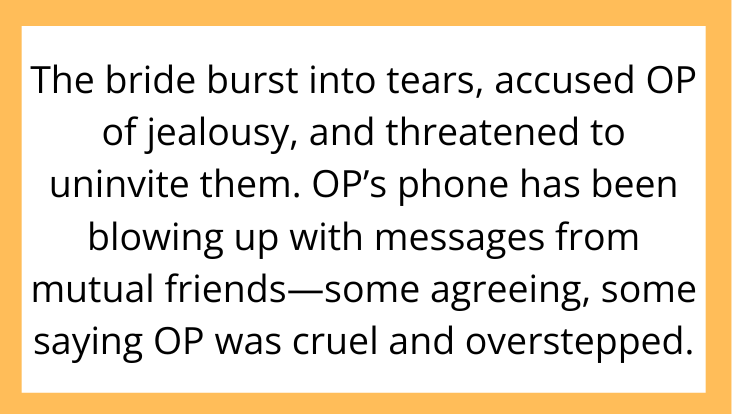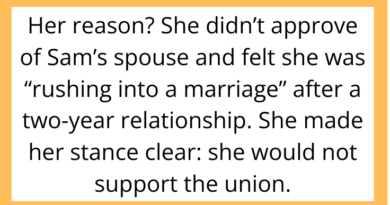AITAH for Telling My Best Friend She’s Ruining Her Own Wedding?
Last night, I came across a viral post in the r/AITAH community that left thousands of people torn. The original poster (OP) asked if they were the bad guy for bluntly telling their best friend that her wedding plans were turning into a disaster. This situation is the perfect example of when honesty and loyalty collide—and how quickly a good intention can look like sabotage.
In this blog post, we’ll unpack the emotional rollercoaster behind this story, the delicate balance between honesty and support, and whether OP really crossed the line.
Let’s dive into the details.
The Situation That Sparked the Drama

OP explained that their best friend of 15 years was planning a lavish destination wedding that few guests could afford. The bride insisted on a week-long celebration at a luxury resort, complete with multiple themed events and expensive dress codes.
As RSVPs trickled in, more than half the invited guests declined because they simply couldn’t take that much time off or cover the costs. When the bride complained about “unsupportive friends,” OP finally snapped and told her she was “ruining her own wedding by making it all about herself.”
The bride burst into tears, accused OP of jealousy, and threatened to uninvite them. OP’s phone has been blowing up with messages from mutual friends—some agreeing, some saying OP was cruel and overstepped.
Friendship vs. Brutal Honesty

When Support Turns into Enabling
One of the biggest questions raised in the comments was whether a true friend should stay quiet to protect someone’s feelings or speak up when they see a train wreck coming.
Many readers sided with OP, arguing that watching your friend alienate her entire social circle isn’t loyalty—it’s enabling. They believed that saying something was ultimately an act of care, even if the delivery was blunt.
When Honesty Feels Like Betrayal
Others argued that timing and tone matter just as much as the truth itself. OP’s choice to unload frustrations while the bride was already stressed may have turned constructive criticism into an attack.
A wedding is an emotionally charged milestone, and even well-meant advice can feel like betrayal if it isn’t shared gently. Some commenters felt OP could have had a private, compassionate conversation instead of confronting the bride in the middle of her meltdown.
The Cost of Big Expectations

Destination Weddings Are Not for Everyone
This story also highlights a trend that’s sparked many r/AITAH debates: destination weddings with sky-high expectations.
While some couples can afford elaborate celebrations, it’s unrealistic to expect everyone else to spend thousands just to attend. From flights and hotels to multiple outfits and days off work, the financial burden is real—and not everyone feels comfortable speaking up about it.
OP’s frustration resonated with readers who have been pressured into attending weddings they couldn’t afford, only to be labeled unsupportive when they declined.
Personal Milestone or Public Spectacle?
At the heart of the argument was the bride’s insistence that her dream wedding should be everyone else’s priority. Some people saw this as entitlement, while others sympathized—after all, it’s supposed to be the most special day of your life.
But where’s the line between celebrating a milestone and making unreasonable demands? That’s the question OP was grappling with, and it’s what made this post so divisive.
Could This Have Been Handled Differently?

A Different Approach
Many commenters offered suggestions for how OP could have handled the situation more gracefully:
-
Choose a private moment to share concerns rather than venting during a crisis.
-
Use “I” statements to avoid sounding accusatory (e.g., “I’m worried people feel pressured” instead of “You’re making this about yourself”).
-
Offer solutions rather than just pointing out problems.
While OP’s honesty was refreshing to some, the approach ultimately caused more harm than good—and potentially cost them a lifelong friendship.
What This Says About Modern Friendships

This scenario shines a light on how friendships are tested when personal milestones clash with real-world limitations. It also shows that even the best intentions can get lost in translation if empathy and timing are missing.
When it comes to weddings, baby showers, or any big life event, it’s natural to want support. But it’s also important to recognize that not everyone can—or should be expected to—sacrifice their own well-being to make someone else’s day perfect.
Final Thoughts

In the end, whether OP is the bad guy depends on your perspective. If you believe honesty is the highest form of loyalty, you’ll likely see OP as a brave friend who said what needed to be said. If you value unconditional support over blunt feedback, you might think OP crossed a line.
Either way, this story is a reminder that communication matters, timing matters, and sometimes the way you deliver the truth can make all the difference.



